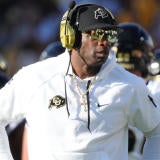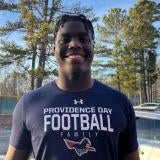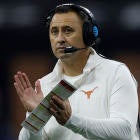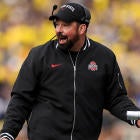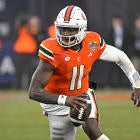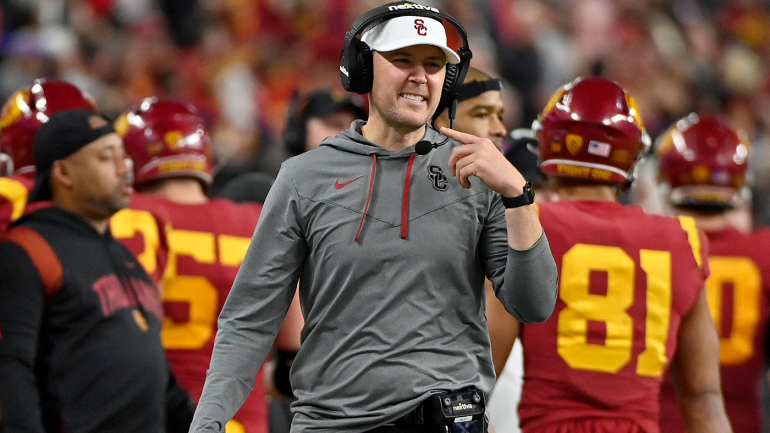
As college football completes spring practice and moves full-speed ahead to the 2023 season, it's clear the sport is in the midst of an upheaval. Besides Oklahoma and Texas moving to the SEC -- just not before experiencing a 14-team Big 12 in 2023 -- USC and UCLA joining the Big Ten and plenty of other changes coming to the game both on and off the field, there has been a clear youth movement in the coaching profession.
The 15 head coaches and assistants listed below will be shaping the future of the game. In fact, many of them have already gotten started. Watching their development is fascinating. Consider that Bear Bryant was a head coach at 32, one year younger than Lincoln Riley when he was first promoted at Oklahoma.
And while the average age of new head coaching hires was actually up from 43.0 in 2022 to 46.7 this year, the young are inheriting the Earth. Seven of the 24 new FBS hires are under the age of 40.
It's possible the game has never been this young across the board. Riley advanced to three College Football Playoffs before age 38. At that age, Joe Paterno was in his 15th season as an assistant at Penn State. Bobby Bowden was still three years away from becoming West Virginia's coach.
Oregon's Dan Lanning already has a championship ring. Arizona State's Kenny Dillingham, the youngest FBS head coach in the country, seems to be the force to finally move the Sun Devils out of mediocrity. It's going to be fun to watch, even more fun to chronicle.
15 coaches under age 40 you need to know
Zach Arnett (36), Mississippi State coach: The loss of Mike Leach will always linger in Starkville, but Arnett is a credible replacement in a time of tragic transition. Coordinating a defense that had to adjust to the pace of the Air Raid (remember: there are a lot of three-and-outs in Leach's offense), Arnett thrived. A disciple of the great Rocky Long, Arnett uses the 3-3-5 "Stack" defense in an SEC that requires physicality. In his first season at Mississippi State in 2020, Arnett took 11 first-time starters and improved the defense that was 11th in the SEC one year prior to fifth. Arnett is a rising star who was destined to be a head coach. The timeline may have been sped up, but the Mississippi State administration was smart for elevating Arnett in a time of crisis.
Alex Golesh (38), South Florida coach: Tennessee's breakout season was also Golesh's breakout season. He developed quarterback Hendon Hooker into a Heisman Trophy finalist. What followed was a massive transformation of Tennessee's program, brand and future. Every step he's taken has been the right one in Golesh's career. He hooked on Iowa State in 2016 and developed the tight end position there. As Josh Heupel's offensive coordinator at UCF in 2020, Golesh ran the nation's No. 1 total offense. It was natural for Heupel to bring him to Tennessee. No surprise the Vols led the nation in yards per play and scoring in 2022. Golesh becomes one of a handful of FBS coaches never to play college football.
Sherrone Moore (37), Michigan offensive coordinator: The argument can be made that Moore's had the most success at mobilizing Jim Harbaugh's offensive vision at Michigan. Sure, the players might be better now, but consider the Wolverines have won back-to-back Big Ten titles going to consecutive College Football Playoffs. Moore, a former Oklahoma guard, has been one of the guiding force behind consecutive Joe Moore Awards, signifying the best offensive line in the country. Running back Blake Corum might have been a Heisman finalist if not for a late-season injury. Quarterback J.J. McCarthy became a difference maker in 2022. Moore arrived in 2018 as tight ends coach and has quickly climbed the ladder.
Doug Belk (35), Houston defensive coordinator: In 2014, Belk took a pay cut to go from a being a Valdosta State assistant to an Alabama graduate assistant. It may have been the best move of his career. In his three seasons under Nick Saban, the Crimson Tide won three SEC titles and the 2015 national championship. His chops developed to the point that Dana Holgorsen took him along to Houston from West Virginia in 2019. Alabama and Georgia reportedly offered Belk position jobs after he became defensive coordinator in 2021. That year, the Cougars led the AAC in total defense.
Brian Hartline (36), Ohio State offensive coordinator: The former Buckeyes wide receiver might have the highest ceiling of any coordinator in the country. Hartline had the coordinator title added to his position coach duties in January. Now, he gets to call plays having already produced some of the best wideouts in the country. Ohio State has become a Wide Receiver U in recent years with Hartline helping produce Chris Olave, Garrett Wilson, Jaxon Smith-Njigba and Marvin Harrison Jr. Hartline reportedly interviewed for the Cincinnati job late last year. He is currently recovering from ATV accident on his property.
Dan Lannning (37), Oregon coach: Georgia's former boy wonder defensive coordinator fit right at Oregon winning 10 games in his first season. The Ducks rebounded from an absolutely horrible debut against Lanning's old team, Georgia, to win eight in a row. Quarterback Bo Nix went from questionable starter to star player. The Ducks could debut in the top 10 and challenge for a CFP spot with Nix returning. If Oregon can hold onto him, the future looks bright with Lanning killing it on the recruiting trail. With realignment looming, the year-to-year progress of the football program bears watching.
Garrett Riley (33), Clemson offensive coordinator: Lincoln's brother was brilliant in 2022. TCU went from 65th in scoring in 2021 to tied for ninth last season. Riley was the tip of the spear of a program that basically had to outscore everyone until Georgia happened along. Riley coached Max Duggan from back up to Heisman finalist. Clemson ultimately came in the offseason with an offer Riley couldn't refuse. He may be the difference in the Tigers regaining their playoff swagger.
Kane Wommack (35), South Alabama coach: In Year 2 with the Jaguars, Wommack won a school record 10 games. He burst on the national scene as a defensive coach at Indiana from 2018-20. In 2018, he was the youngest Power Five coordinator in the country. In 2020, Wommack helped develop a defense that led the nation in interceptions and red zone efficiency. Wommack is "home" at a place he was defensive coordinator in 2016-17.
Lincoln Riley (39), USC coach: The best young coach in the country pulled off one of the best year-over-year turnarounds in history. The Trojans went from a soft crew that won four games to an 11-game winner that challenged for a CFP spot with a Heisman quarterback. While Riley's defenses still leave something to be desired, the future couldn't be brighter. Caleb Williams is back, entry into the Big Ten looms, true believers are filling the stands, and Riley is killing it in recruiting. A Pac-12 (or Big Ten) title and playoff berth can't be far behind. For a guy about to age out of this category, Riley might leave an under-40 legacy that can't be beat.
Kenny Dillingham (33), Arizona State coach: ASU had grown stale and underachieving. Oh, and don't forget the ongoing NCAA investigation left behind by Herm Edwards. Enter Dillingham, a native son who wants to retire as Sun Devils' coach. He has completely revamped the roster (46 new faces) and made ASU fun. Now the hard part: making ASU dangerous. Dillingham would have been on this list had he not gotten the Sun Devils' job. Before the age of 33, he had been offensive coordinator at four FBS programs, three of them in the Power Five.
Marcus Freeman (37), Notre Dame coach: Not a bad first season (9-4) for a guy with no head coaching experience. Freeman became the third Fighting Irish coach to win at least nine games in his debut season since 2002. There were wins over four ranked teams, including then-No. 5 Clemson. The 329 yards allowed per game were the second fewest for the Irish since 2012. Notre Dame could use an offensive upgrade, but on first impression, the former Cincinnati and ND defensive coordinator proved he belongs in the big time.
Ryan Walters (37), Purdue coach: Walters could have written his ticket to anywhere after last season but chose Purdue. In two years, the former Colorado safety took Illinois from 97th in scoring defense to first nationally. If he can do that at Illinois, he can do it at Purdue. Walters will run a base 3-4 scheme, one that completely bamboozled Nebraska's Scott Frost in the opener. (Illinois won 30-22.) Walters is the first defensive coach to take over Purdue since Joe Tiller in 1987. He is the fourth-youngest coach in Power Five and eighth-youngest in FBS.
Glenn Schumann (33), Georgia co-defensive coordinator: One of the few constants in Georgia's budding dynasty is Schumann, who came to Georgia with coach Kirby Smart from Alabama in 2016. Since 2019, he has been co-defensive boss. In the last three seasons, Georgia has finished second, second and third nationally in total defense. On a staff that grows head coaches (Mel Tucker, Sam Pittman, Dan Lanning), Schumann might be the next one to land such a gig. Smart made sure Schumann didn't leave this offseason, bumping him from $805,000 per year to $1.9 million after there was interest from the Philadelphia Eagles.
Josh Gattis (39), Maryland offensive coordinator: There was downturn in his career last season as Gattis was fired at Miami. However, the Hurricanes had a lot more problems than the offense, so look for Gattis to rebound at Maryland. It is his third Big Ten job since 2014. In between, he joined with Mike Locksley at Alabama in 2018 to run a unit that finished third in scoring and first in the SEC in total offense. At Michigan, Gattis' 2021 offense was the most productive since 2010. Gattis left Bama having worked with Tua Tagovailoa and a roomful of talented receivers. Harbaugh gave Gattis his first shot at running an offense. Watch for Maryland to continue its upward progression offensively as Gattis reunites with Locksley.
Alex Atkins (38), Florida State offensive coordinator: Jordan Travis' Heisman candidacy has a main author. Atkins is in his fourth year with the Seminoles, second as offensive coordinator. In 2022, Travis had a career year in leading the Noles back to relevancy. Just like Travis, Atkins found his way. In the last 34 games, Atkins has had to deal with 18 different offensive line combinations. In 2022, FSU was third nationally in explosive play rate. The Noles led the ACC in third-down offense, yards per pass and yards per play. Get your popcorn for 2023 watching Atkins quarterback whisper to Travis.







